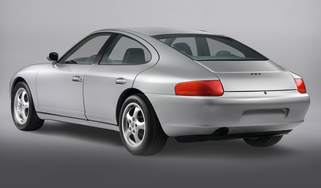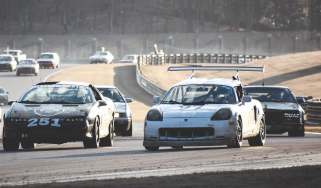Porsche 968 - review, history, prices and specs
Best remembered for the tactile Club Sport, Porsche’s 968 bridged the gap between 944 and Boxster
When the Porsche 924 arrived in 1976, Porsche was very much a stranger to the front-engined, rear-wheel-drive layout. And by the time the 968 bowed out in 1995 to be replaced by the mid-engined Boxster – another layout Porsche had only dabbled in to a fairly small degree – it’s fair to say the German sports car brand had mastered it.
In that time, the transaxle cars had gone from being a curiosity that gave a welcome boost to Porsche’s pocketbook (and one perhaps given only cursory attention by the cognoscenti), to a respected and capable machine in its own right. In the 968 Club Sport, it also had one of the best Porsche driver’s cars outside of the 911 range.
> Porsche 968 Club Sport - behind the wheel of an icon
To everybody else, the 968 was, for the longest time, a relatively affordable way to put a Porsche on the driveway. With prices once more slowly creeping upwards, it’s time once again to reflect on what made the 968 special.
Porsche 968 in detail
The 968’s story is perhaps best prefaced with the story of Porsche’s first front-engined model, the 924. It’s a well-trodden path, but would inform the next 19 years of the company’s history.
The 924 was a joint project between Volkswagen and Porsche, the former seeking a flagship sports car and the latter exactly the opposite, wishing to replace the quirky mid-engined 914 with a new entry-level model. A Volkswagen-derived engine would be used to keep costs down, while Porsche chose the transaxle layout, placing the gearbox at the rear axle to find the perfect front to rear balance.
Then, in 1973, the OPEC embargo led to both a recession and a spike in oil prices. Suddenly a sports car no longer seemed a priority for Volkswagen, which instead spun the Scirocco off a new front-wheel-drive platform developed for its Beetle replacement, the Golf. Porsche bought the rights to the 924, building it in Neckarsulm (an Audi plant), and the rest is history.
The 1982 944 was effectively a heavy revision of the 924 platform, now packing a 2.5-litre Porsche-designed four-cylinder and offering handling and performance more befitting of the Porsche badge. Despite heavy revisions in 1989 though, with the 944 S2, the car was looking long in the tooth, and in 1991, once again in financial difficulties, Porsche refreshed it as cost-effectively as possible.
Originally the new car was to become the 944 S3, but revisions were so comprehensive it was introduced as the 968. While the form was similar, there was new curvy 1990s styling, with 928-style round pop-up headlights and soap-bar tail lights. The interior remained much the same as that of the 944 S2, but the engine was more heavily updated. It was essentially a development of the S2’s 3-litre four-pot, but now produced 237bhp compared to just 208bhp – lighter internals, improved breathing, more sophisticated electronics and Porsche’s VarioCam variable valve timing all contributed. A six-speed gearbox (or a four-speed Tiptronic auto) was also fitted.
The structure was much like that of the 944, still retaining a steel monocoque with struts up front and semi-trailing arms behind, but Porsche claimed as much as 80 per cent of the 968 was new compared to the 944.
It was the Club Sport though, introduced in 1993, that was the most exciting new addition. Lighter and more basic than the standard 968, its drivetrain was carried over in its entirety from the regular car, but it shed 50kg of weight (down to 1320kg) thanks to deletion of the rear seats, air conditioning, rear wiper, plenty of sound insulation material, and electric windows.
A pair of Recaro bucket seats set off the interior too, their hard backs neatly mirroring the simple exterior colours: Speed Yellow, Guards Red, Maritime Blue, Riviera Blue, and Grand Prix White. Porsche would even let you colour-match the wheels to the exterior finish too.
Brilliantly, the Club Sport was actually less expensive than the regular 968 – these being the days when a lighter, more hardcore model generally reduced the price rather than increasing it. In another shrewd move, Porsche understood that for some the absence of certain creature comforts may be enough to put off a few customers, so introduced the Sport model soon after, keeping the Club Sport’s ethos but reinstalling items such as the air conditioning and rear seats.
By the mid 1990s Porsche was still in financial difficulties. Development work had begun on a replacement for the 968 in 1992, and in 1993 it presented the Boxster concept at the Detroit motor show. The pert, compact roadster was the highlight of the show, and while the production Boxster that replaced the 968 in 1996 was less defined, its shared componentry with the new 996 helped cut Porsche’s costs, and turned around the company’s fortunes. It would be 2002, with the launch of the Cayenne, before Porsche made another front-engined car.
Specs
| 968 | 968 Sport | Club Sport | |
| Engine | 2990cc, 4-cyl | 2990cc, 4-cyl | 2990cc, 4-cyl |
| Power (bhp @ rpm) | 237 @ 6200 | 237 @ 6200 | 237 @ 6200 |
| Torque (lb ft @ rpm) | 225 @ 4100 | 225 @ 4100 | 225 @ 4100 |
| Weight (kg) | 1370 | 1324 | 1320 |
| Power-to-weight (bhp/ton) | 176 | 182 | 182 |
| 0-62mph (sec) | 6.5sec | 6.5sec | 6.5sec |
| Top speed (mph) | 157mph | 157mph | 157mph |
| Price | £33,547 (1993) | £32,995 (1994) | £28,975 (1993) |
What we said
Porsche 968 Club Sport, ‘Non-911 Porsches’ (evo 208, May 2015)
‘Time is tight and mileage limited, but the Club Sport gets so much right it’s easy to see why it was so critically acclaimed. The big 3-litre four-cylinder engine has a booming, torquey delivery and yet remains smooth and full of energy as the revs rise. The ’box is weighty and has a similarly long throw to the 924’s but is more precise and feels stronger.
‘Power assistance may now be present for the steering, but it’s mild and retains the weight and textured feedback, so you instantly feel completely locked in to what the front wheels are doing. The Club Sport has a really infectious character defined by that brawny engine and the similarly robust feel to all the controls. It feels like it wants you to get stuck in and discover its ultimate balance.’
Porsche 968 Club Sport, ‘Icons’ (evo 253, November 2018)
‘I wasn’t expecting the Club Sport to still feel gutsy, but it does. Put your foot down and the short-stroke four delivers a proper kick and energises the car beyond what the bald figures suggest. It defies the numbers partly I think because it responds crisply to the throttle and is so willing and smooth, the latter thanks to its contra-rotating balancer shafts, licensed from Mitsubishi. It’s an engine that enjoys digging deep just as much as keening to the red line.
‘In the Club Sport you feel so comfortable with what the chassis is doing beneath you that on a seriously twisty road you’re flicking the steering left and right, the nose precise and glued to its line while the back end is fluid, the rear tyres smearing on the tarmac as the car drifts modestly from apex to apex. It’s an absolute joy, performance and grip almost perfectly matched to create a moment of transcendence that all the best-handling icons share.’
What to pay
| Porsche 968 | £13,000-25,000 |
| Porsche 968 Sport | £15,000-25,000 |
| Porsche 968 Club Sport | £23,000-35,000 |






